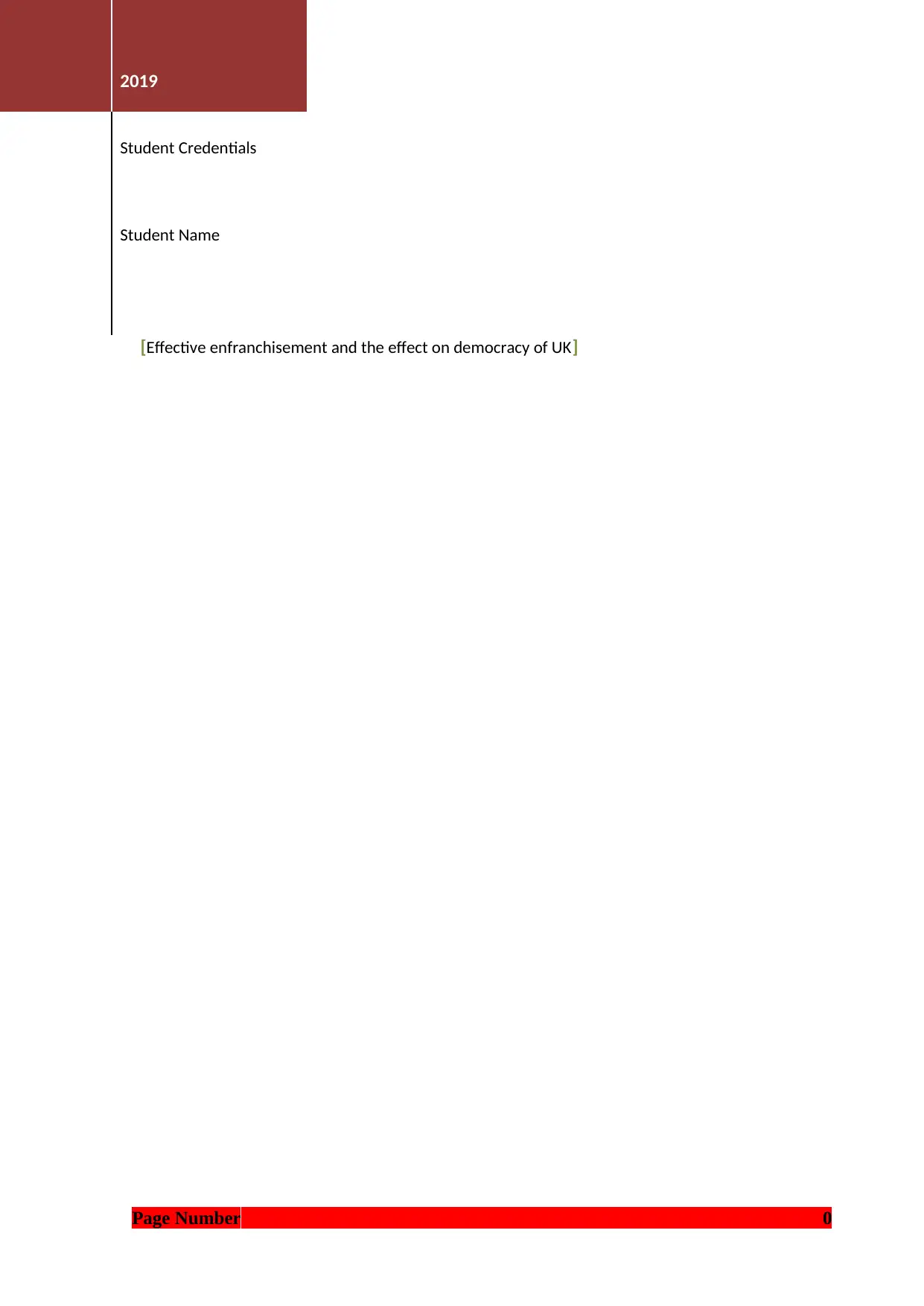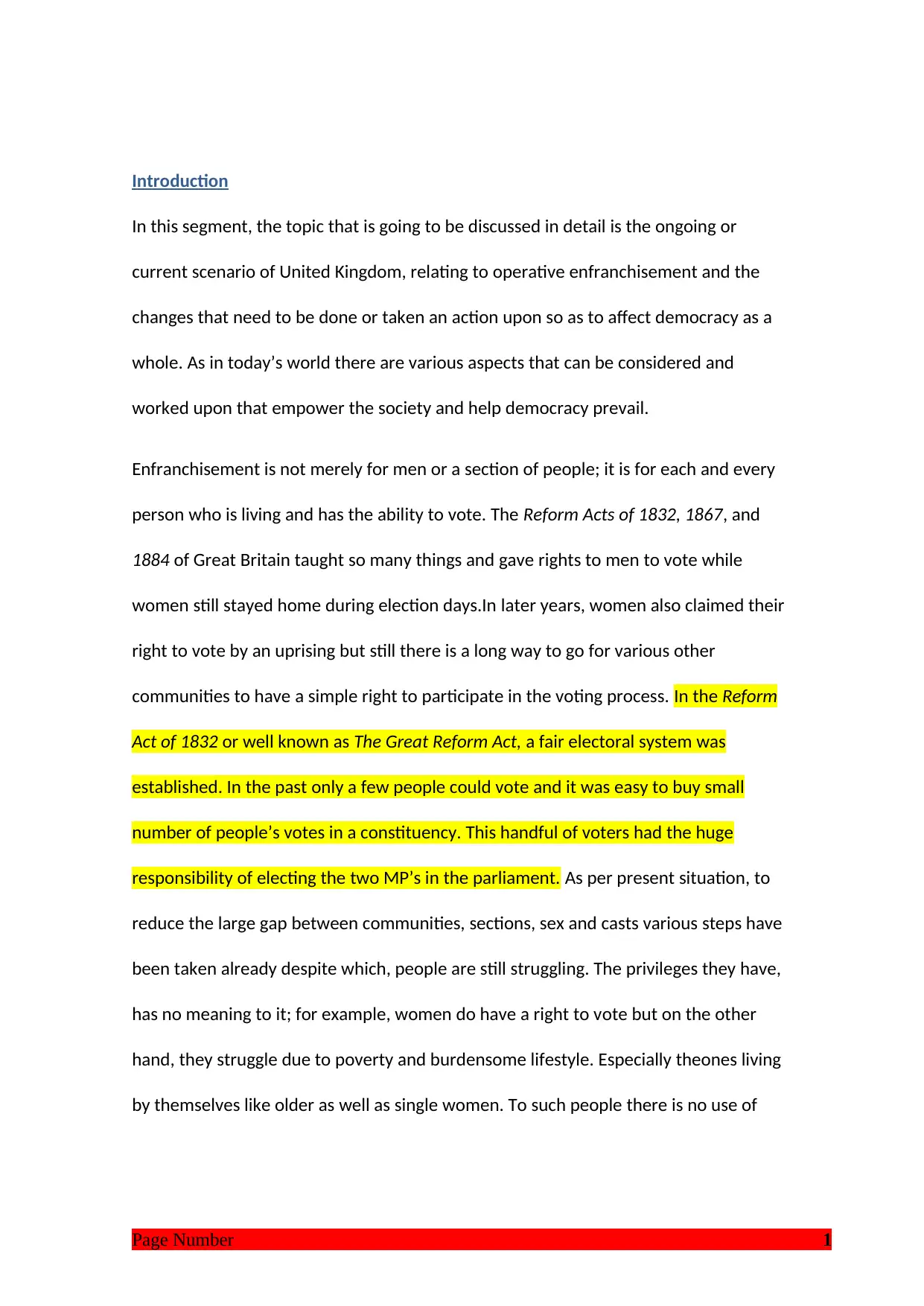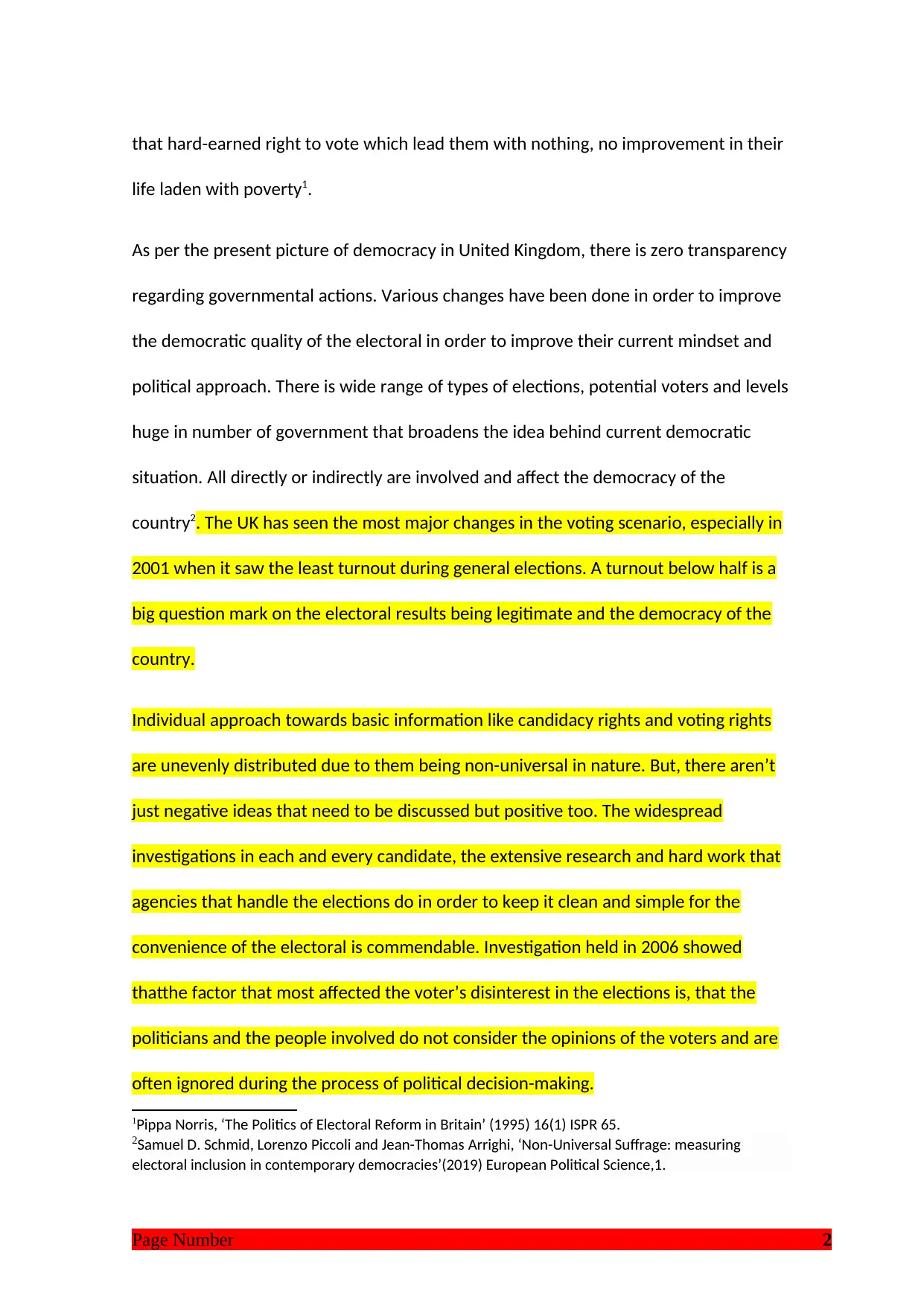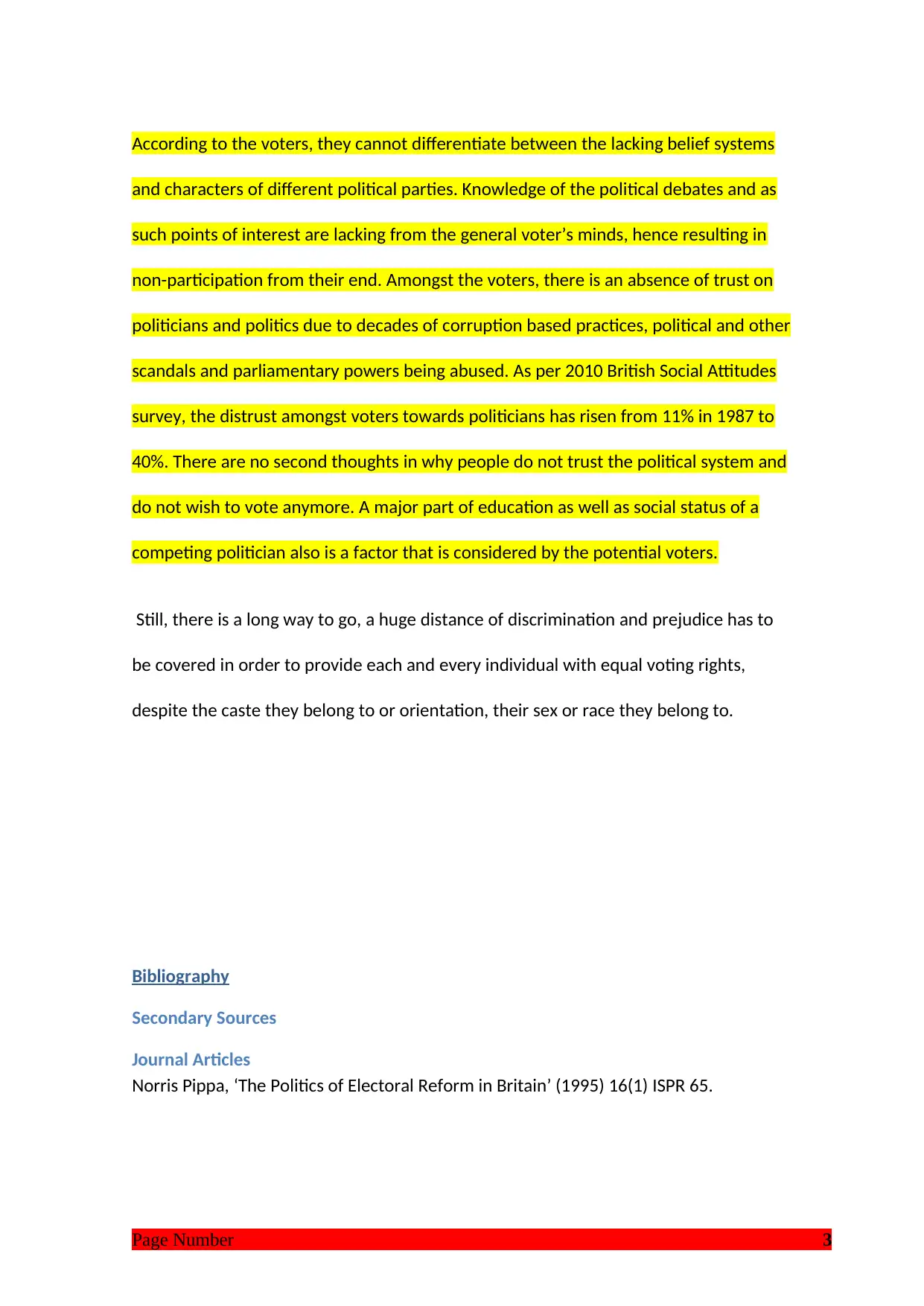Effective enfranchisement and the effect on democracy of UK
VerifiedAdded on 2022/10/18
|5
|897
|250
AI Summary
This article discusses the ongoing scenario of enfranchisement in the UK and its effect on democracy. It highlights the need for equal voting rights for all individuals, regardless of their caste, orientation, sex, or race. The article also sheds light on the lack of transparency in governmental actions and the uneven distribution of basic information like candidacy and voting rights. The extensive research and hard work done by agencies handling elections to keep it clean and simple for the convenience of the electoral is also discussed.
Contribute Materials
Your contribution can guide someone’s learning journey. Share your
documents today.

[Effective enfranchisement and the effect on democracy of UK]
Page Number 0
2019
Student Credentials
Student Name
Page Number 0
2019
Student Credentials
Student Name
Secure Best Marks with AI Grader
Need help grading? Try our AI Grader for instant feedback on your assignments.

Introduction
In this segment, the topic that is going to be discussed in detail is the ongoing or
current scenario of United Kingdom, relating to operative enfranchisement and the
changes that need to be done or taken an action upon so as to affect democracy as a
whole. As in today’s world there are various aspects that can be considered and
worked upon that empower the society and help democracy prevail.
Enfranchisement is not merely for men or a section of people; it is for each and every
person who is living and has the ability to vote. The Reform Acts of 1832, 1867, and
1884 of Great Britain taught so many things and gave rights to men to vote while
women still stayed home during election days.In later years, women also claimed their
right to vote by an uprising but still there is a long way to go for various other
communities to have a simple right to participate in the voting process. In the Reform
Act of 1832 or well known as The Great Reform Act, a fair electoral system was
established. In the past only a few people could vote and it was easy to buy small
number of people’s votes in a constituency. This handful of voters had the huge
responsibility of electing the two MP’s in the parliament. As per present situation, to
reduce the large gap between communities, sections, sex and casts various steps have
been taken already despite which, people are still struggling. The privileges they have,
has no meaning to it; for example, women do have a right to vote but on the other
hand, they struggle due to poverty and burdensome lifestyle. Especially theones living
by themselves like older as well as single women. To such people there is no use of
Page Number 1
In this segment, the topic that is going to be discussed in detail is the ongoing or
current scenario of United Kingdom, relating to operative enfranchisement and the
changes that need to be done or taken an action upon so as to affect democracy as a
whole. As in today’s world there are various aspects that can be considered and
worked upon that empower the society and help democracy prevail.
Enfranchisement is not merely for men or a section of people; it is for each and every
person who is living and has the ability to vote. The Reform Acts of 1832, 1867, and
1884 of Great Britain taught so many things and gave rights to men to vote while
women still stayed home during election days.In later years, women also claimed their
right to vote by an uprising but still there is a long way to go for various other
communities to have a simple right to participate in the voting process. In the Reform
Act of 1832 or well known as The Great Reform Act, a fair electoral system was
established. In the past only a few people could vote and it was easy to buy small
number of people’s votes in a constituency. This handful of voters had the huge
responsibility of electing the two MP’s in the parliament. As per present situation, to
reduce the large gap between communities, sections, sex and casts various steps have
been taken already despite which, people are still struggling. The privileges they have,
has no meaning to it; for example, women do have a right to vote but on the other
hand, they struggle due to poverty and burdensome lifestyle. Especially theones living
by themselves like older as well as single women. To such people there is no use of
Page Number 1

that hard-earned right to vote which lead them with nothing, no improvement in their
life laden with poverty1.
As per the present picture of democracy in United Kingdom, there is zero transparency
regarding governmental actions. Various changes have been done in order to improve
the democratic quality of the electoral in order to improve their current mindset and
political approach. There is wide range of types of elections, potential voters and levels
huge in number of government that broadens the idea behind current democratic
situation. All directly or indirectly are involved and affect the democracy of the
country2. The UK has seen the most major changes in the voting scenario, especially in
2001 when it saw the least turnout during general elections. A turnout below half is a
big question mark on the electoral results being legitimate and the democracy of the
country.
Individual approach towards basic information like candidacy rights and voting rights
are unevenly distributed due to them being non-universal in nature. But, there aren’t
just negative ideas that need to be discussed but positive too. The widespread
investigations in each and every candidate, the extensive research and hard work that
agencies that handle the elections do in order to keep it clean and simple for the
convenience of the electoral is commendable. Investigation held in 2006 showed
thatthe factor that most affected the voter’s disinterest in the elections is, that the
politicians and the people involved do not consider the opinions of the voters and are
often ignored during the process of political decision-making.
1Pippa Norris, ‘The Politics of Electoral Reform in Britain’ (1995) 16(1) ISPR 65.
2Samuel D. Schmid, Lorenzo Piccoli and Jean-Thomas Arrighi, ‘Non-Universal Suffrage: measuring
electoral inclusion in contemporary democracies’(2019) European Political Science,1.
Page Number 2
life laden with poverty1.
As per the present picture of democracy in United Kingdom, there is zero transparency
regarding governmental actions. Various changes have been done in order to improve
the democratic quality of the electoral in order to improve their current mindset and
political approach. There is wide range of types of elections, potential voters and levels
huge in number of government that broadens the idea behind current democratic
situation. All directly or indirectly are involved and affect the democracy of the
country2. The UK has seen the most major changes in the voting scenario, especially in
2001 when it saw the least turnout during general elections. A turnout below half is a
big question mark on the electoral results being legitimate and the democracy of the
country.
Individual approach towards basic information like candidacy rights and voting rights
are unevenly distributed due to them being non-universal in nature. But, there aren’t
just negative ideas that need to be discussed but positive too. The widespread
investigations in each and every candidate, the extensive research and hard work that
agencies that handle the elections do in order to keep it clean and simple for the
convenience of the electoral is commendable. Investigation held in 2006 showed
thatthe factor that most affected the voter’s disinterest in the elections is, that the
politicians and the people involved do not consider the opinions of the voters and are
often ignored during the process of political decision-making.
1Pippa Norris, ‘The Politics of Electoral Reform in Britain’ (1995) 16(1) ISPR 65.
2Samuel D. Schmid, Lorenzo Piccoli and Jean-Thomas Arrighi, ‘Non-Universal Suffrage: measuring
electoral inclusion in contemporary democracies’(2019) European Political Science,1.
Page Number 2

According to the voters, they cannot differentiate between the lacking belief systems
and characters of different political parties. Knowledge of the political debates and as
such points of interest are lacking from the general voter’s minds, hence resulting in
non-participation from their end. Amongst the voters, there is an absence of trust on
politicians and politics due to decades of corruption based practices, political and other
scandals and parliamentary powers being abused. As per 2010 British Social Attitudes
survey, the distrust amongst voters towards politicians has risen from 11% in 1987 to
40%. There are no second thoughts in why people do not trust the political system and
do not wish to vote anymore. A major part of education as well as social status of a
competing politician also is a factor that is considered by the potential voters.
Still, there is a long way to go, a huge distance of discrimination and prejudice has to
be covered in order to provide each and every individual with equal voting rights,
despite the caste they belong to or orientation, their sex or race they belong to.
Bibliography
Secondary Sources
Journal Articles
Norris Pippa, ‘The Politics of Electoral Reform in Britain’ (1995) 16(1) ISPR 65.
Page Number 3
and characters of different political parties. Knowledge of the political debates and as
such points of interest are lacking from the general voter’s minds, hence resulting in
non-participation from their end. Amongst the voters, there is an absence of trust on
politicians and politics due to decades of corruption based practices, political and other
scandals and parliamentary powers being abused. As per 2010 British Social Attitudes
survey, the distrust amongst voters towards politicians has risen from 11% in 1987 to
40%. There are no second thoughts in why people do not trust the political system and
do not wish to vote anymore. A major part of education as well as social status of a
competing politician also is a factor that is considered by the potential voters.
Still, there is a long way to go, a huge distance of discrimination and prejudice has to
be covered in order to provide each and every individual with equal voting rights,
despite the caste they belong to or orientation, their sex or race they belong to.
Bibliography
Secondary Sources
Journal Articles
Norris Pippa, ‘The Politics of Electoral Reform in Britain’ (1995) 16(1) ISPR 65.
Page Number 3
Secure Best Marks with AI Grader
Need help grading? Try our AI Grader for instant feedback on your assignments.

Schmid D Samuel, Piccoli Lorenzo, and Arrighi Jean-Thomas, ‘Non-Universal Suffrage:
measuring electoral inclusion in contemporary democracies’ (2019) European Political
Science, 1.
Page Number 4
measuring electoral inclusion in contemporary democracies’ (2019) European Political
Science, 1.
Page Number 4
1 out of 5
Your All-in-One AI-Powered Toolkit for Academic Success.
+13062052269
info@desklib.com
Available 24*7 on WhatsApp / Email
![[object Object]](/_next/static/media/star-bottom.7253800d.svg)
Unlock your academic potential
© 2024 | Zucol Services PVT LTD | All rights reserved.
